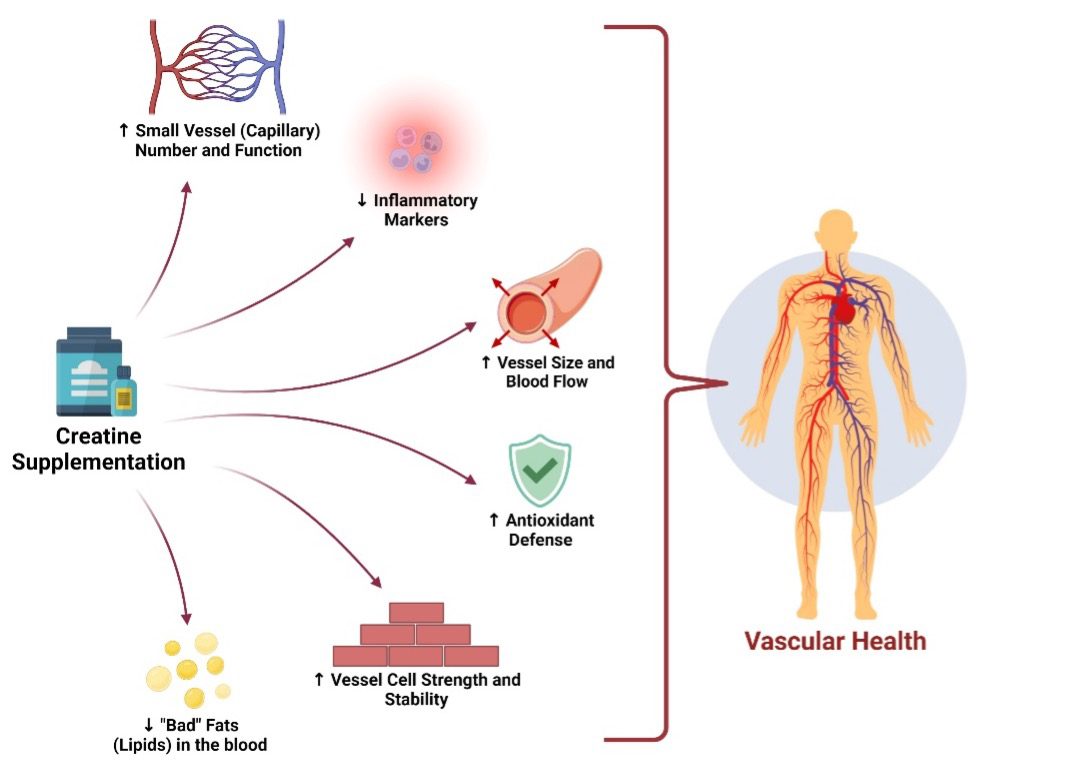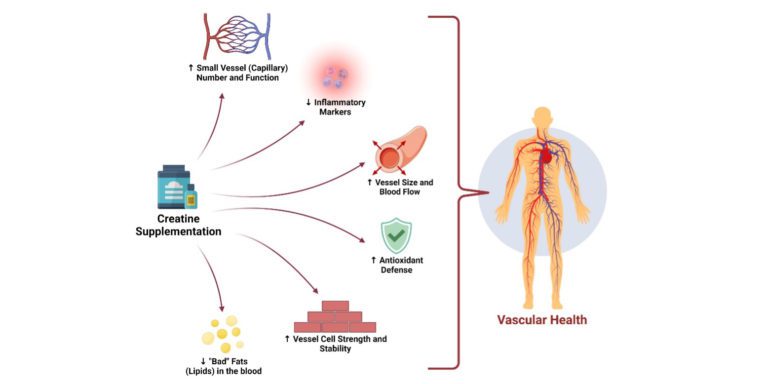Holly Clarke, PhD., Robert Hickner, PhD., & Michael Ormsbee, PhD.
Since the 1970s, cardiovascular diseases (CVDs), or diseases that impact the heart and or the blood vessels, have remained the leading cause of death in the United States [1]. CVDs, while being complex, all often result in poor blood flow and circulation throughout the body, resulting in damage to tissues and organs. Considering the devastating impact of CVDs, what can we do to help reduce our risk of CVD and to help promote heart and vessel health throughout our lifespan? Despite prescription drugs being highly effective against CVD, and often serving as the “first line” of defense, they are not without their drawbacks. Many drugs, for example, are associated with unpleasant side effects, such as headaches, stomach issues, skin irritations, and overall fatigue.

With an increased awareness around the drawbacks of pharmaceuticals, nutritional interventions have grown in popularity. You may have heard of the term “superfoods”, a term often used to indicate foods and supplements that contain significant nutritional value and provide health benefits. While there is a large selection of foods and supplements that offer health-benefits for the heart and vessels, such as berries, nuts, leafy green vegetables, Vitamin C and l-arginine [2, 3], one supplement of particular interest is creatine. Creatine, most commonly known as a “bro-supplement” used by gym goers and athletes to help increase exercise performance, is one of the most popular supplements on the open market. Whilst creatine reached its fame following its consumption by Olympic gold-medalists in 1992, having been shown to unquestionably benefit sport performance, new research indicates that this supplement has the potential to do so much more! By giving “creatine” a quick internet search, you will undoubtedly be faced with vast evidence surrounding creatine’s application for muscle performance, recovery and growth. However, creatine plays a large role in many bodily functions. In fact, common symptoms of creatine disorders can include seizures, movement and behavioral disorders, intellectual disability, and digestive problems. Therefore, it is clear that creatine plays a substantial role in overall health. It is this importance of creatine that has prompted many researchers to question what other health-benefiting properties creatine supplementation may provide?
Since 1992, creatine has been scientifically shown to benefit brain health, help to control blood sugar in those with diabetes, reduce fatigue, improve heart health in those suffering from heart disease, benefit immune function, and has even been shown to benefit those with chronic kidney disease [4, 5]. With all these health-benefiting qualities, one could ask, what could creatine do for vessel health? Could creatine play an important role in the health and function of our vessels? Could creatine help reduce CVD risk?
In an early study published in 2001, authors reported that creatine, when combined with resistance training, significantly improved blood flow in both the lower leg and forearm [6]. A later study, published in 2011, found that creatine supplementation significantly improved vessel response to a short bout of exercise. Creatine contributed to a greater recovery in heart rate, better blood pressure, and reduced vessel stiffness following exercise [7]. In both 2014 and 2019, two researchers investigated the impact of creatine upon the smaller vessels of the body, known as the capillaries [8, 9]. Both studies found that following creatine supplementation, there was a significant increase in the number of capillaries in a given area (density), and an increase in capillary use (recruitment) following an increase in blood flow. So, taking these studies into consideration, there is some evidence to suggest that creatine may play a role in vessel health and function.
Despite the success of these studies, however, we are still left asking, how? HOW is creatine working to help promote vessel health and reduce CVD risk?
Diseases that impact the vessels do not develop overnight, and are often the result of continued exposure to harmful molecules in the body. One of the primary causes of vascular disease is oxidative stress. Oxidative stress is an imbalance between damaging molecules – free radicals – and the body’s natural defense – antioxidants. Unfortunately, many factors such as a poor diet, lack of activity, smoking, and stress, can all increase the amount of free radicals in the body and increase one’s risk of CVD. Despite our body possessing antioxidants to help battle these free radicals, this defense does weaken with age. So, what can we do to help? Fortunately, many “superfoods” and supplements can provide extra support to our antioxidant defense, and have been shown to help promote vessel health. There is evidence to suggest that creatine could function as an antioxidant-supporting supplement. Early research by Lawler showed the direct antioxidant potential of creatine [10], whereas other studies have found creatine working in other intricate ways, within cells, to reduce the production of free radicals [11-13]. Therefore, if creatine can serve as an antioxidant, creatine may be able to promote vessel health and reduce CVD risk.
Another common cause of vascular disease and poor vessel health is inflammation. Although inflammation is an essential part of the healing process, if inflammatory cells in the body hang around for too long, this can lead to chronic inflammation. Inflammatory cells, if not controlled, can harm the vessels of the body, changing their structure and function. Although the body does not have a natural defense against chronic inflammation, there are certain foods and supplements that have been shown to help. Anti-inflammatory foods can include berries, fish, green leafy vegetables, and certain nuts. Creatine, however, has also been shown to help offer some beneficial anti-inflammatory properties. A study published by Nomura and colleagues highlighted how creatine supplementation led to a significant reduction in inflammatory markers, such as ICAM-1 and E-selectin, both of which are closely associated with vascular disease risk [14]. Nomura also reported that creatine helped to protect the cells lining the vessels against the damage inflicted by inflammation. Since this discovery, other studies have further supported the notion that creatine can serve as an anti-inflammatory supplement [15-17]. Therefore, creatine may promote vessel health by reducing inflammation, keeping damaging inflammatory markers at bay.
So, there is evidence to suggest that creatine could benefit one’s vessel health through serving as an antioxidant and as an anti-inflammatory; but, how else may creatine benefit vessel health?
Another common cause of vascular disease is an increase in circulating “fatty” substances in the body, also known as lipids. Now, much like anything, not all fatty molecules are bad, however an uncontrolled or elevated amount of “bad” fats can lead to vessel damage. High levels of fats can be caused by many factors, including poor diet, lack of exercise, smoking, and aging. Fortunately, however, there are certain nutritional interventions that can help lower the amount and production of these “bad” fats in the body. As you may have guessed, creatine supplementation has been shown to offer some lipid-lowering abilities, helping to reduce the amount of “bad” fats such as low-density lipoprotein (LDL), oxidative-LDL (oxLDL), and cholesterol [8, 18, 19]. Creatine has also been shown to reduce the production of bad fats in the body, not only protecting the vessels but also protecting organs such as the liver from the damage caused by fatty molecules [20, 21].
So, we have touched upon the antioxidant, anti-inflammatory, and lipid-lowering ability of creatine, and how these properties contribute to the promotion of vessel health, and a reduction in disease risk. But believe it or not, there is more! Emerging evidence indicates that creatine supplementation also helps to increase the strength of the cells lining the vessels themselves [14, 22]. Creatine has also been shown to help control and manage the size of our vessels, thereby supporting blood flow, blood pressure, and blood delivery [8, 9, 23]. Furthermore, in addition to lowering the “bad” fats, creatine has been shown to reduce homocysteine, a nasty molecule closely associated with vessel damage and disease [9, 24, 25].
Hopefully it is clear that creatine supplementation can contribute to so much more than just boosting your efforts in the gym. Creatine plays a vital role within the body, helping to support a variety of sophisticated processes, all of which supporting healthy form and function. Creatine, with all the described benefits and more, could indeed contribute to healthy vessels and a reduction in vascular disease risk. Although new evidence is emerging, and still needed, creatine shows great potential as a vascular-benefiting supplement.
References:
- Murphy, S., et al., Mortality in the United States, 2020. NCHS Data Brief, no 427. National Center for Health Statistics: Hyattsville, MD, USA, 2021.
- Bronzato, S. and A. Durante, Dietary Supplements and Cardiovascular Diseases. Int J Prev Med, 2018. 9: p. 80.
- Sosnowska, B., P. Penson, and M. Banach, The role of nutraceuticals in the prevention of cardiovascular disease. Cardiovasc Diagn Ther, 2017. 7(Suppl 1): p. S21-S31.
- Wallimann, T., M. Tokarska-Schlattner, and U. Schlattner, The creatine kinase system and pleiotropic effects of creatine. Amino Acids, 2011. 40(5): p. 1271-96.
- Kreider, R.B. and J.R. Stout, Creatine in Health and Disease. Nutrients, 2021. 13(2): p. 447.
- Arciero, P.J., et al., Comparison of creatine ingestion and resistance training on energy expenditure and limb blood flow. Metabolism, 2001. 50(12): p. 1429-34.
- Sanchez-Gonzalez, M.A., et al., Creatine supplementation attenuates hemodynamic and arterial stiffness responses following an acute bout of isokinetic exercise. Eur J Appl Physiol, 2011. 111(9): p. 1965-71.
- Moraes, R., et al., Effects of dietary creatine supplementation on systemic microvascular density and reactivity in healthy young adults. Nutr J, 2014. 13(1): p. 115.
- Van Bavel, D., R. de Moraes, and E. Tibirica, Effects of dietary supplementation with creatine on homocysteinemia and systemic microvascular endothelial function in individuals adhering to vegan diets. Fundam Clin Pharmacol, 2018.
- Lawler, J.M., et al., Direct antioxidant properties of creatine. Biochem Biophys Res Commun, 2002. 290(1): p. 47-52.
- Sestili, P., et al., Creatine as an antioxidant. Amino Acids, 2011. 40(5): p. 1385-96.
- Meyer, L.E., et al., Mitochondrial creatine kinase activity prevents reactive oxygen species generation: antioxidant role of mitochondrial kinase-dependent ADP re-cycling activity. J Biol Chem, 2006. 281(49): p. 37361-71.
- Guimaraes-Ferreira, L., et al., Short-term creatine supplementation decreases reactive oxygen species content with no changes in expression and activity of antioxidant enzymes in skeletal muscle. Eur J Appl Physiol, 2012. 112(11): p. 3905-11.
- Nomura, A., et al., Anti-inflammatory activity of creatine supplementation in endothelial cells in vitro. Br J Pharmacol, 2003. 139(4): p. 715-20.
- Khanna, N.K. and B.R. Madan, Studies on the anti-inflammatory activity of creatine. Arch Int Pharmacodyn Ther, 1978. 231(2): p. 340-50.
- Candow, D.G., et al., Effectiveness of Creatine Supplementation on Aging Muscle and Bone: Focus on Falls Prevention and Inflammation. Journal of Clinical Medicine, 2019. 8(4): p. 488.
- Bassit, R.A., R. Curi, and L.F. Costa Rosa, Creatine supplementation reduces plasma levels of pro-inflammatory cytokines and PGE2 after a half-ironman competition. Amino Acids, 2008. 35(2): p. 425-31.
- Rahimi, R., Creatine supplementation decreases oxidative DNA damage and lipid peroxidation induced by a single bout of resistance exercise. J Strength Cond Res, 2011. 25(12): p. 3448-55.
- Deminice, R. and A.A. Jordao, Creatine supplementation decreases plasma lipid peroxidation markers and enhances anaerobic performance in rats. Redox Rep, 2016. 21(1): p. 31-36.
- Deminice, R., et al., Creatine supplementation as a possible new therapeutic approach for fatty liver disease: early findings. Amino Acids, 2016. 48(8): p. 1983-91.
- da Silva, R.P., et al., Creatine reduces hepatic TG accumulation in hepatocytes by stimulating fatty acid oxidation. Biochim Biophys Acta, 2014. 1841(11): p. 1639-46.
- Wyss, M. and A. Schulze, Health implications of creatine: can oral creatine supplementation protect against neurological and atherosclerotic disease? Neuroscience, 2002. 112(2): p. 243-60.
- Guerrero, M.L., et al., Metabolic support of Na+ pump in apically permeabilized A6 kidney cell epithelia: role of creatine kinase. Am J Physiol, 1997. 272(2 Pt 1): p. C697-706.
- McCarty, M.F., Supplemental creatine may decrease serum homocysteine and abolish the homocysteine ‚gender gap‘ by suppressing endogenous creatine synthesis. Med Hypotheses, 2001. 56(1): p. 5-7.
- Bereket-Yucel, S., Creatine supplementation alters homocysteine level in resistance trained men. J Sports Med Phys Fitness, 2015. 55(4): p. 313-9.
- Clarke, H., et al., The Evolving Applications of Creatine Supplementation: Could Creatine Improve Vascular Health? Nutrients, 2020. 12(9): p. 2834.
- Clarke, H., R.C. Hickner, and M.J. Ormsbee, The Potential Role of Creatine in Vascular Health. Nutrients, 2021. 13(3): p. 857.
Einen Vortrag zu diesem Thema haben die Autoren auf der Creatine Conference 2022 gehalten.
Weitere Themen dazu finden Sie auch direkt auf der Website der Conference HIER



